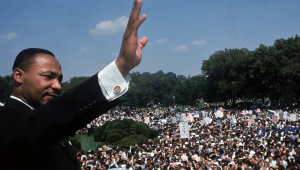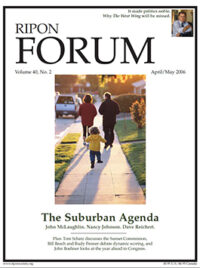When Americans marked the birthdays of Abraham Lincoln and Martin Luther King, Jr., earlier this year, we were paying tribute to two leaders who did more to advance the causes of equality, human dignity, and civil rights in this country than perhaps any other Americans.
We were also paying tribute to two leaders who found their source of strength in one common place – scripture. As we reflect on their lives and consider how their actions helped shape our world, it might also be worthwhile to reflect on how their use of scripture helped unify the nation, and how the example they set remains highly relevant today.
American history has been marked by one glaring contradiction – slavery – followed by its godchild – segregation. While many defenders of slavery came from the ranks of learned Protestant clergy, particularly in the South, Christianity had a significant role in eradicating slavery – in its first stage, one hundred years after our founding; in its second stage, another hundred years later.
During the first stage, the language and cadences of scripture, which had been used to justify slavery, played a significant role in its elimination. Lincoln’s use of scriptural language, perhaps best exemplified in his Second Inaugural Address, is significant in this regard:
“Both read the same Bible and pray to the same God, and each invokes His aid against the other.”
“It may seem strange that any men should dare to ask a just God’s assistance in wringing their bread from the sweat of other men’s faces, but let us judge not, that we be not judged.”

At the deepest, most personal level, Lincoln and King Affirmed that the opportunity for individuals to live freely and flourish is a -if not the- fundamental promise and premise of American life.
“Fondly do we hope, fervently do we pray, that this mighty scourge of war may speedily pass away. Yet, if God wills that it continue…as was said three thousand years ago, so still it must be said ‘the judgments of the Lord are true and righteous altogether.’”
These most remembered phrases operate at a mythical level. They give voice to the idea that a nation cannot be free as long as some of its citizens are enslaved. This combination of community and individualism marks American society at its best.
A century later, scripture played an equally significant role in eradicating segregation through the voice of Dr. Martin Luther King, Jr. His famous “I Have A Dream” speech, delivered on the steps of the Lincoln Memorial, is resplendent with Biblical language and images:
“We are not satisfied, and we will not be satisfied until ‘justice rolls down like waters, and righteous like a mighty stream.’”
“I have a dream that one day every valley shall be exalted, and every hill and mountain shall be made low, the rough places will be made plain, and the crooked places will be made straight; ‘and the glory of the Lord shall be revealed and all flesh shall see it together.’”
King’s most memorable passage, which emerges from these Biblical images, leans toward individualism as a constitutive element of community in America:
“I have a dream that one day my four children will live in a nation where they will not be judged by the color of their skin but by the content of their character.”
Lincoln and King used Biblical language that spoke to community. Their language transcended differences, religious and otherwise. At the deepest, most personal level, Lincoln and King affirmed that the opportunity for individuals to live freely and flourish is a — if not the — fundamental promise and premise of American life. These two speeches of these two leaders are certainly among the most historically significant uses of scripture in American history.
The reason their use of scripture was so powerful is that it addressed a fundamental dimension of American culture – one that is spiritual and existential. Their use of scripture was much deeper than the way today’s political parties and religious camps volley individual verses across the net at one another – with great intensity – seeking to score political or theological points and drive one another out of the game.
The capacity to give voice to individualism is crucial to Americans. But at our best, we recognize that for individualism to flourish, communities must be healthy. Lincoln and King captured this creative balance in their use of scripture. For our nation to flourish, we must capture the balance between individualism and community. For our nation to flourish “under God,” we would benefit by looking at the way Lincoln and King used scripture.
Indeed, whoever aspires to lead our nation at this crucial point in our history – a time when Judaism, Christianity, and Islam have come to play such an important role in our domestic and international affairs – needs to affirm the individualism so important to our heritage in a way that lifts the community as the context in which individuals can flourish.
Lincoln and King affirmed that premise in a way that resonated and shaped American history. Despite the plethora of religious books in the marketplace and of religious leaders influencing national policy, no political or religious leader of recent decades has connected scripture to the creative tension between individualism and community that marks our society.
I hope someone will. Soon.
Larry R. Hayward is the Pastor of Westminster Presbyterian Church in Alexandria, Virginia.




